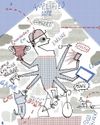
In mid-March 2020, COVID-19 locked down most of Europe and Asia. For Sterimed, a 900-employee maker of high-end sterile medical packaging, this development brought mixed news. The sudden 40 percent increase in demand for its products was welcome, but ramping up production within its French plants posed a real challenge. One element was particularly thorny: Procuring protective masks for workers was impossible in France.
Because it refused to endanger its employees, Sterimed needed masks. Having sold its products to China for years, it quickly realized that one of its Chinese clients was producing protective masks and could send several boxes of free samples, which didn’t infringe on China’s ban on the commercial export of masks. Sterimed ended up with more masks than it needed, and CEO Thibaut Hyvernat immediately thought he could pass them on. “I started calling my friends who run businesses and began sharing some of the spare masks,” he told us. Then, something struck him: “Instead of helping several dozen friends, I could help 20 million friends!”
Hyvernat found out that more than one of Sterimed’s Chinese clients were manufacturing protective masks and that China was lifting its export ban. Working from his home in suburban Paris, he called an executive team meeting, and in 10 minutes the group decided to launch a totally new activity: importing medical supplies. The company leveraged its core technical, regulatory, and supply chain capabilities to put in place the needed financing and logistics. By mid-April, the company had brought 25 million masks from China to France. Sterimed sold them at cost plus estimated transportation fees. “If air transportation costs exceed our estimations, we may well lose money. But that is not the point,” remarked Hyvernat at the time.
This story is from the Autumn 2020 edition of strategy+business.
Start your 7-day Magzter GOLD free trial to access thousands of curated premium stories, and 9,000+ magazines and newspapers.
Already a subscriber ? Sign In
This story is from the Autumn 2020 edition of strategy+business.
Start your 7-day Magzter GOLD free trial to access thousands of curated premium stories, and 9,000+ magazines and newspapers.
Already a subscriber? Sign In

Transforming information into insight
Focus on six organizational elements to build a world-class data and insights capability.

THE URGENT NEED FOR SOPHISTICATED LEADERSHIP
The pandemic has highlighted a series of paradoxes inherent to the work of leaders. What comes next will depend on how well leaders face up to them.

The road to successful change is lined with trade-offs
Rather than trying to convince people your change initiative is the right one, invite them to talk openly about what it might take to implement it: the good, the bad, and the frustrating.

Sustaining productivity virtually
Maintaining productivity levels among remote employees is an enduring challenge. Here are five ways to help businesses and employees thrive while people work at home.

FORWARD TO normal
Entertainment and media companies are building business models that are resilient to the enduring changes in consumer behavior ushered in by COVID-19.

How leaders can promote racial justice in the workplace
Embrace four principles to turn today’s diversity, equity, and inclusion initiatives into sustained progress.

CREATING THE OFFICE OF THE FUTURE
In a remodeled world, it is vital for companies to reinvent ways of working.

Consumer companies must take leaps, not steps
As shoppers show how quickly they can adapt to external shocks, retailers will need to radically reconfigure their business models.

Businesses can fast-track innovation to help during a crisis
“Unrealistic” timelines can actually work. Here’s how.

Agility and experience management work better together
Many companies achieve early wins with separate transformational efforts, then stall. But if combined and enhanced using “return on experience,” or ROX, measures, these two programs can unlock each other’s potential.